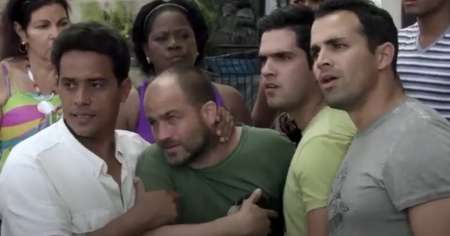The renowned Cuban actor Fernando Echevarría expressed his concern about the situation of teachers in Cuba, highlighting their crucial role in the country's development and the preservation of its cultural identity.
In a discussion where the Cuban leader Miguel Díaz-Canel was present, Echevarría emphasized that efforts to improve the conditions of teachers are essential for the future of the nation, on the occasion of Educator's Day in Cuba.
"Everything done to dignify teachers is essential. There lies the future president of the country, there lies the future scientist, there lies the future of the homeland. Without them, there is no homeland", stated the actor, emphasizing the importance of educators as the architects of the upcoming generations.
Additionally, he emphasized that teachers are also guardians of the national culture: "There lies the culture of the country, and without culture, there are no homelands."
While Echevarría is considered an advocate of the Cuban regime's doctrine, his message can also be interpreted as a wake-up call to the government, highlighting that the current initiatives are insufficient to reverse the situation.
The lack of resources, low salaries, and the exodus of professionals have put educators in a vulnerable position, raising doubts about the authorities' genuine commitment to this sector.
Fernando Echevarría is not only remembered for his portrayal of the famous Nacho Capitán in the novel “Tierra Brava,” but also for being the face of Castroist propaganda on Cuban television against the implementation of Title III of the Helms-Burton Act in 2019.
These merits place him sitting next to the Cuban leader in one of the halls of the so-called Palace of the Revolution, where Díaz-Canel responded to the educators with a repetitive speech devoid of concrete proposals.
"We can enhance unity through participation. And you spoke of participation; when everyone participates, when everyone contributes, when we connect with one another, when we all defend projects, when we stand up for a cause, and when we all contribute and create victory.", he said.
Although the island has historically been recognized for its high literacy rates and focus on vocational training, teachers today face precarious working conditions.
The exodus of professionals from the education sector has been one of the main consequences of this crisis. Many teachers have chosen to emigrate or leave the profession in search of better economic opportunities, resulting in vacancies that are difficult to fill and impacting the quality of education.
At the same time, the deterioration of the school infrastructure and the shortage of basic materials such as books and supplies also reflect the tensions within the Cuban educational system.
Frequently Asked Questions about the Situation of Teachers in Cuba and the Discourse of Fernando Echevarría
What issues do teachers in Cuba face according to Fernando Echevarría?
The Cuban actor Fernando Echevarría expressed that teachers in Cuba are facing a situation of vulnerability due to the lack of resources, low salaries, and the exodus of professionals. These conditions cast doubt on the government's real commitment to the education sector.
How has the Cuban government reacted to criticisms about education?
The government, represented by Miguel Díaz-Canel, has responded to criticism with repetitive speeches that do not offer concrete solutions and emphasize participation and unity as a response to the problems. However, effective measures have not been implemented to improve the conditions of teachers.
What is the impact of the exodus of teachers on the Cuban educational system?
The exodus of teachers has left vacancies that are difficult to fill, which affects the quality of education in Cuba. This migration of professionals in search of better economic opportunities further weakens the country's educational system.
What role do teachers play in Cuban culture according to Echevarría?
Fernando Echevarría emphasized that teachers are guardians of national culture and essential for the preservation of Cuba's cultural identity. Without culture, there is no homeland, and teachers are key to educating future generations.
Filed under:
